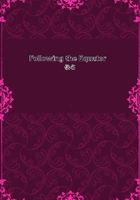
第262章
Every one is a moon, and has a dark side which he never shows to anybody.
--Pudd'nhead Wilson's New Calendar.
When I scribbled in my note-book a year ago the paragraph which ends the preceding chapter, it was meant to indicate, in an extravagant form, two things: the conflicting nature of the information conveyed by the citizen to the stranger concerning South African politics, and the resulting confusion created in the stranger's mind thereby.
But it does not seem so very extravagant now. Nothing could in that disturbed and excited time make South African politics clear or quite rational to the citizen of the country because his personal interest and his political prejudices were in his way; and nothing could make those politics clear or rational to the stranger, the sources of his information being such as they were.
I was in South Africa some little time. When I arrived there the political pot was boiling fiercely. Four months previously, Jameson had plunged over the Transvaal border with about 600 armed horsemen at his back, to go to the "relief of the women and children" of Johannesburg; on the fourth day of his march the Boers had defeated him in battle, and carried him and his men to Pretoria, the capital, as prisoners; the Boer government had turned Jameson and his officers over to the British government for trial, and shipped them to England; next, it had arrested 64 important citizens of Johannesburg as raid-conspirators, condemned their four leaders to death, then commuted the sentences, and now the 64were waiting, in jail, for further results. Before midsummer they were all out excepting two, who refused to sign the petitions for release; 58had been fined $10,000 each and enlarged, and the four leaders had gotten off with fines of $125,000 each with permanent exile added, in one case.
Those were wonderfully interesting days for a stranger, and I was glad. to be in the thick of the excitement. Everybody was talking, and Iexpected to understand the whole of one side of it in a very little while.
I was disappointed. There were singularities, perplexities, unaccountabilities about it which I was not able to master. I had no personal access to Boers--their side was a secret to me, aside from what I was able to gather of it from published statements. My sympathies were soon with the Reformers in the Pretoria jail, with their friends, and with their cause. By diligent inquiry in Johannesburg I found out--apparently--all the details of their side of the quarrel except one--what they expected to accomplish by an armed rising.
Nobody seemed to know.
The reason why the Reformers were discontented and wanted some changes made, seemed quite clear. In Johannesburg it was claimed that the Uitlanders (strangers, foreigners) paid thirteen-fifteenths of the Transvaal taxes, yet got little or nothing for it. Their city had no charter; it had no municipal government; it could levy no taxes for drainage, water-supply, paving, cleaning, sanitation, policing. There was a police force, but it was composed of Boers, it was furnished by the State Government, and the city had no control over it. Mining was very costly; the government enormously increased the cost by putting burdensome taxes upon the mines, the output, the machinery, the buildings; by burdensome imposts upon incoming materials; by burdensome railway-freight-charges. Hardest of all to bear, the government reserved to itself a monopoly in that essential thing, dynamite, and burdened it with an extravagant price. The detested Hollander from over the water held all the public offices. The government was rank with corruption.
The Uitlander had no vote, and must live in the State ten or twelve years before he could get one. He was not represented in the Raad (legislature) that oppressed him and fleeced him. Religion was not free.
There were no schools where the teaching was in English, yet the great majority of the white population of the State knew no tongue but that.
The State would not pass a liquor law; but allowed a great trade in cheap vile brandy among the blacks, with the result that 25 per cent. of the 50,000 blacks employed in the mines were usually drunk and incapable of working.
There--it was plain enough that the reasons for wanting some changes made were abundant and reasonable, if this statement of the existing grievances was correct.
What the Uitlanders wanted was reform--under the existing Republic.
What they proposed to do was to secure these reforms by, prayer, petition, and persuasion.
They did petition. Also, they issued a Manifesto, whose very first note is a bugle-blast of loyalty: "We want the establishment of this Republic as a true Republic."Could anything be clearer than the Uitlander's statement of the grievances and oppressions under which they were suffering? Could anything be more legal and citizen-like and law-respecting than their attitude as expressed by their Manifesto? No. Those things were perfectly clear, perfectly comprehensible.
But at this point the puzzles and riddles and confusions begin to flock in. You have arrived at a place which you cannot quite understand.
For you find that as a preparation for this loyal, lawful, and in every way unexceptionable attempt to persuade the government to right their grievances, the Uitlanders had smuggled a Maxim gun or two and 1,500muskets into the town, concealed in oil tanks and coal cars, and had begun to form and drill military companies composed of clerks, merchants, and citizens generally.
What was their idea? Did they suppose that the Boers would attack them for petitioning, for redress? That could not be.
Did they suppose that the Boers would attack them even for issuing a Manifesto demanding relief under the existing government?
Yes, they apparently believed so, because the air was full of talk of forcing the government to grant redress if it were not granted peacefully.